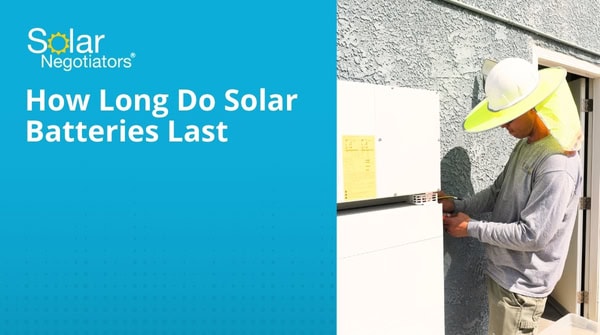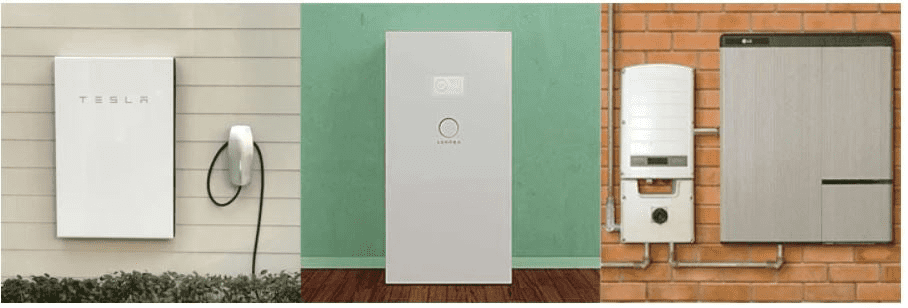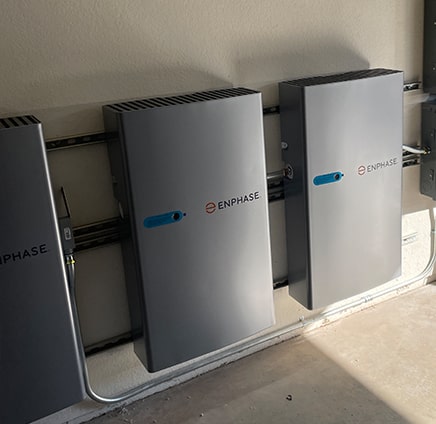
How Long Do Solar Batteries Last?
Making an informed decision about solar energy storage is not just about the immediate benefits but also about evaluating the long-term value of your investment.
In this post, we’ll explore why knowing the lifespan of your solar batteries can help you plan better for your investment and allow you to maximize your energy savings.
What Are Solar Batteries?

Solar batteries operate in conjunction with solar panels, allowing solar energy to be stored for later use. With a solar and battery storage system, any excess energy produced by the solar panels that is not immediately used by your home, is instead stored in your solar batteries for later use.. This allows homeowners to capitalize on their stored energy after sunset, reducing reliance on the grid and potentially avoiding higher utility rates during peak hours.
How Long Do Solar Batteries Last?
On average, solar batteries last 5-15 years while solar panels can last 25-30 years. It’s important to work with a solar contractor that uses solar battery brands that offer warranty on their products. Solar Negotiators’ solar batteries typically come with a 10 year warranty. The solar batteries that we’ve chosen have been carefully hand-selected for longevity and reliability, after being audited by our most senior solar experts.
How Do Solar Batteries and Solar Panels Interact With Each Other?
The direct current (DC) electricity produced by the solar panels is converted into alternating current (AC) electricity by an inverter. Once converted to AC, the electricity is used to power your home’s appliances and electronics.
If your solar panels produce more electricity than your home needs at any given moment, the excess energy can be used in two ways, depending on whether you have a solar battery system:
- Without a battery: Excess energy will be sent back to the grid (in a grid-tied system), and you may receive credits from your utility company through net metering. Due to the NEM 3.0 rule change in 2023, any solar contract that is concluded after April 14, 2023 will result in a substantial reduction in the value of credits paid by electric companies in California by up to 70% compared to pre-NEM 3.0 contracts. Click here to see current rates for solar power production under NEM-3 policy.
- With a battery: Excess energy charges your solar battery, storing the power for later use. This is now the industry standard in California and advances in solar battery technology allows us to be more energy self-sufficient.
What Impacts Solar Battery Longevity?

There are a couple of factors that impact solar battery longevity, including the solar battery type, usage frequency, and where the battery is stored.
Battery Types
Lead Acid Batteries: These batteries are cheaper and easy to find, but they don’t last as long and need more care.
Lithium Ion Batteries: These are industry-standard and most products you will find on the market today contain lithium-ion. They last longer and need less upkeep than lead acid batteries but cost more at the start. They must be handled carefully because they can be dangerous if damaged.
Lithium Iron Phosphate (LiFePO4) Batteries: These are safer and last even longer than other types as they contain more energy cycles. They’re great for off-grid solar systems because they’re very reliable but maybe more expensive.
Energy Usage
When it comes to batteries, long-lasting power and lifespan are usually top of mind. One factor to consider is the number of cycles it can handle in its lifetime. “Cycles” is the number of times you can drain and then recharge a battery. The more cycles a battery has, the more life it should have.
It will be important for you to talk to your solar contractor about how many cycles your warranty covers. Battery warranties will usually include details about how many cycles or years they’ll cover, depending on which limit you reach first.
Installation Location
The location of your solar battery installation is crucial, considering both weather exposure and safety regulations. Although placing batteries indoors or in a garage is favorable for weather protection, adhering to housing jurisdiction codes often mandates outdoor installation for larger systems. Solar Negotiators ensures compliance with safety code regulations by exclusively installing all of our battery systems outdoors, where they can withstand common weather conditions while optimizing functionality.
It’s essential to engage in a dialogue with your solar installer to pinpoint the ideal installation site based on your specific location and system design.
How long do solar batteries take to charge?
The time it takes to charge a battery can vary depending on the type of battery, inverter, size of solar system, angle of the sun, presence of clouds, or other weather conditions.
One general rule of thumb is to expect 1 hour per every 1kWh generated by the solar panel system. Your solar installer should be able to help you set your expectations for how much time it will take to charge your specific battery.
How long do solar panels last?
Solar panels can last 25+ years with scheduled maintenance and repairs if needed. Inverters are common replacements that can happen anywhere between 10-25 years. Fortunately, the replacement is typically covered by your installing solar contractor’s labor warranty–meaning no additional costs outside of lost solar production should be incurred by the homeowner.
However, the efficiency of the panels may degrade over time due to exposure to environmental factors such as extreme temperatures, humidity, and UV radiation. This degradation is typically factored into the manufacturer’s warranty.
How often do solar batteries need to be replaced?
While solar batteries generally last 5-15 years, as long as your battery is working properly, you won’t need to replace it. However, to ensure you maximize your energy cost savings and solar production, once you need to replace your battery, it is important to do so under California’s current solar policies.
Summary
The longevity of your solar batteries is an important consideration that involves careful research, planning, and making sure your solar installer chooses the right batteries to be installed correctly, following proper housing jurisdiction codes. The life of a solar battery will be dependent on the number of cycles, and the type of battery it is. Generally, solar batteries will last anywhere from 5-15 years which leaves plenty of time to generate a net positive return on a long-term solar investment.
Solar Negotiators is a well-known solar installer, offering durable solar batteries backed by comprehensive warranties and expert advice tailored to your unique energy needs. By choosing our solar expertise, you benefit from our careful selection from top solar battery brands, ensuring energy efficiency, durability, and longevity. This enables you to maximize your savings while enjoying the protection offered by our warranties.
Recent Posts
Reduce your reliance on the energy grid.
Get Solar In
Your Inbox

Refer friends and get paid in-app
The more referrals you bring in, the higher your earnings.
Earn $1,000 for each referral, and bonuses of up to $1,500 once you hit your 10th referral.



